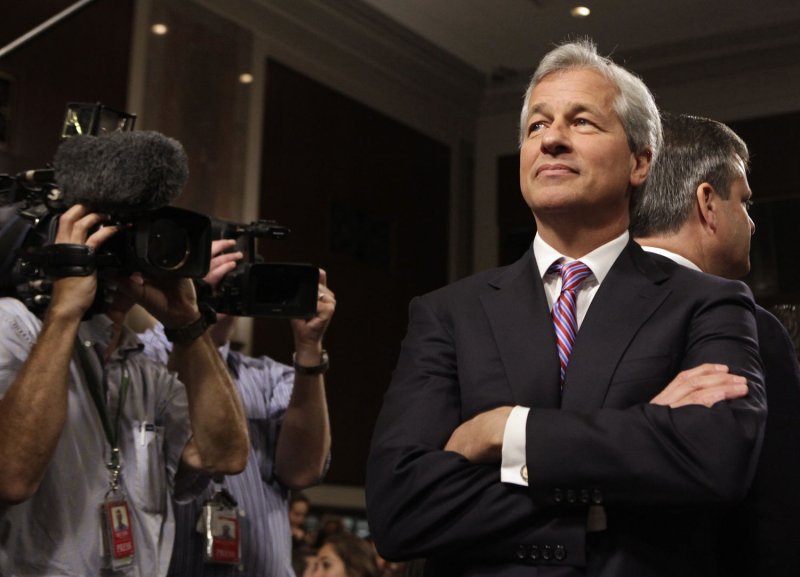JPMorgan Chase and Company CEO Jamie Dimon arrives to testify before a Senate Banking, Housing and Urban Affairs Committee hearing on Capitol Hill in Washington on June 13, 2012. UPI/Yuri Gripas. |
License Photo
WASHINGTON, June 19 (UPI) -- The head of JPMorgan Chase Tuesday told a U.S. House panel an effort to limit risk actually led to the bank's massive losses in May.
"We did lose some of our shareholder's money and for that we feel terrible," Jamie Dimon, chairman and chief executive officer, said before the House Committee on Financial Services.
Dimon also told the panel Italy's financial crisis is less critical than that in Greece.
"Italy, surprisingly, is actually a very wealthy nation and they have the wherewithal to meet their debt, but they're having a crisis of confidence which is damaging that," he said.
JPMorgan Chase, the largest U.S. bank, suffered an unexpected loss of more than $2 billion, rocking the financial community. The bank lost the money in a lightning-fast 15 days in a series of bets on credit default swaps in a bid to hedge risks. The company's chief investment officer retired in the wake of the losses.
Dimon told the panel beginning in December 2011, "we instructed [investment officials] to reduce risk-grade assets and associated risk. To achieve this in the synthetic credit portfolio, the [investment office] could simply have reduced its existing positions. Instead starting in mid-January, it embarked on a complex strategy that entailed adding positions that it believed would offset the existing ones.
"This strategy, however, ended up creating a portfolio that was larger and ultimately resulted in even more complex and hard to manage risks," he added. "This portfolio morphed into something that rather than protect the firm, created new and potentially larger risks. As a result, we've let a lot of people down and we are sorry for it."
Earlier, Martin Gruenberg, acting chairman of the board of the Federal Deposit Insurance Corp., told the committee: "The FDIC has added temporary staff to assist in our current review. ... [The FDIC and other] agencies are conducting an in-depth review of both the risk-measurement tools used by the firm and the governance and limit structures in place within the chief investment office unit where the losses occurred.
He added, the "FDIC joined the [Office of the Comptroller of the Currency] and the New York Federal Reserve Bank in daily meetings with the firm" after the debacle. "Initially these meetings focused on gaining an understanding of the events leading up to the escalating losses."
He said the FDIC has continued to participate in the daily meetings between the firm and its primary regulators. "We are looking at the strength of the [chief investment officer's] risk-management, governance and control frameworks, including the setting and monitoring of risk limits."
Although the focus of the review is the circumstances that led to the losses, "the FDIC is also working with JPMorgan Chase's primary federal regulators to assess any other potential gaps within the firm's overall risk-management practices," he said.
"Without speaking to the specifics of the case ... the recent losses attest to the speed with which risks can materialize in a large, complex derivatives portfolio," he said. "The recent losses also highlight that it's important for financial regulatory agencies to have access to timely risk-related information about derivatives and other market-sensitive exposures, to analyze the data effectively, and to regularly share findings and observations."
The committee also heard from Thomas Curry, comptroller of the currency at the Treasury Department; Mary Schapiro, chairwoman of the Securities and Exchange Commission; Gary Gensler, chairman of the Commodity Futures Trading Commission; and Scott Alvarez, counsel for the Federal Reserve System Board of Governors.















